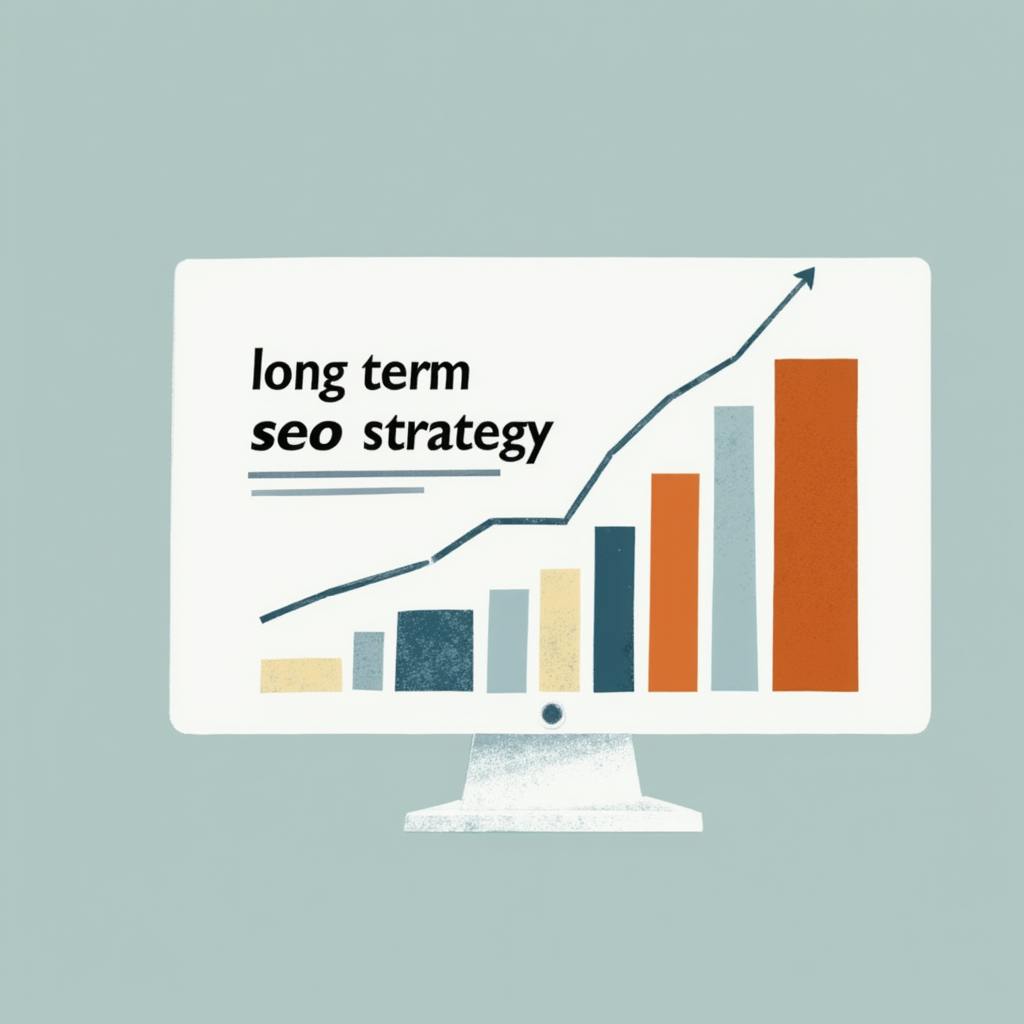Staying ahead requires more than just a passing familiarity with search engine algorithms. It's about constructing a solid long term SEO strategy that ensures sustainable seo practices, providing a foundation for building long-term seo success. A well-planned SEO strategy for future-proof websites not only boosts current performance but also lays the groundwork for ongoing growth and visibility, regardless of how search dynamics evolve. Whether you're just beginning your SEO journey or looking to refine your existing efforts, solidifying an approach that delivers measurable, long-term results is vital.
Understanding Sustainable SEO Practices
To start, it is essential to highlight sustainable seo practices as the cornerstone of any successful long-term plan. Sustainable SEO goes beyond quick fixes; it involves strategies that yield results now and into the future. These practices include:
- Quality Content Creation: Developing valuable, relevant, and informative content that serves your audience's needs is crucial. High-quality content not only attracts but retains users, encouraging repeat visits and engagement.
- Keyword Research and Optimization: Utilizing insightful keyword research and optimizing for both short-tail and long-tail keywords ensures that your content aligns with user intent and search queries.
- Technical SEO: Ensuring your website is technically sound enhances search engine crawling and indexing. This includes optimizing site speed, utilizing structured data, and maintaining a mobile-friendly design.

AI made with Dean Jones
SEO Planning for Long-Term Results
Effective seo planning for long-term results requires a comprehensive approach that takes into account various factors:
- Consistent Monitoring and Reporting: Regular analysis of SEO metrics such as organic traffic, bounce rates, and conversion rates helps identify areas of improvement and measure success over time.
- Adapting to Algorithm Changes: Search engines frequently update their algorithms. Staying informed about these changes and adjusting your strategy accordingly is crucial for maintaining and improving your search rankings.
- Competitor Analysis: Keeping an eye on your competitors allows you to identify opportunities and gaps in your strategy, ensuring you remain competitive in your niche.
Building Long-Term SEO Success
Building long-term SEO success demands not only implementing the right strategies but fostering partnerships and continually innovating:
- Cultivating Backlinks Naturally: Quality backlinks from reputable sources enhance your website's authority and trustworthiness in the eyes of search engines. Engage in guest blogging, partnerships, and community engagement to acquire these links effectively.
- Focus on User Experience: A website that provides a seamless, intuitive user experience will naturally see improved search performance. This includes easy navigation, engaging content, and fast loading times.
- Educating and Empowering Your Team: SEO is not a one-person job. By educating your team about SEO best practices, you ensure that everyone contributes toward maintaining and enhancing the website's SEO status.
Future-Proofing SEO Strategy
The heart of an SEO strategy for future-proof websites lies in:
- Embracing Emerging Technologies: Stay ahead by incorporating emerging technologies such as voice search optimization, AI-driven tools, and video content in your SEO plans.
- Local and Global SEO Strategies: Tailor your approach to include both local SEO to drive regional traffic and global strategies for international visibility, depending on your business goals.
- Long-Term Vision and Flexibility: A successful long-term SEO strategy is rooted in a clear vision but remains flexible enough to adapt to market changes and technology advances.
Frequently Asked Questions
How long does it take to see results from a long term SEO strategy?
SEO is a long-term investment, and while some improvements can be seen in a few months, significant results typically take six to twelve months to materialize.
Is content still king in SEO?
Absolutely. High-quality content remains one of the most critical components of sustainable seo practices. As search algorithms evolve, they increasingly prefer content that is relevant and valuable to users.
Can SEO alone drive business success?
While SEO is vital, it's just one component of a broader digital marketing strategy that should include social media, paid advertising, and other channels to drive comprehensive business success.

AI made with Dean Jones
Long-Term SEO Strategy: An In-Depth FAQ
Creating a successful long term SEO strategy is critical for ensuring sustained organic growth, visibility, and competitiveness in today’s digital landscape. Here’s a detailed FAQ guide featuring insights into developing and maintaining a robust long term SEO strategy.
What are the key elements to incorporate in a winning long term SEO strategy?
1. Keyword Research and Optimization:
- Conduct thorough keyword research to identify high-value, relevant keywords.
- Focus on both short-tail and long-tail keywords to cover broad and niche search intents.
- Optimize content with these keywords naturally to maximize relevance and reduce bounce rates.
2. Content Strategy:
- Develop high-quality, valuable, and engaging content that addresses user needs and preferences.
- Maintain a content calendar to ensure consistent publishing and updating of content.
- Leverage different content formats such as blogs, videos, infographics, and podcasts to engage diverse audiences.
3. Technical SEO:
- Ensure your website is mobile-friendly and loads quickly.
- Implement a logical URL structure and use schema markup to enhance SERP visibility.
- Maintain a clean and navigable site architecture, enabling search engines to crawl your content efficiently.
4. On-Page and Off-Page SEO:
- Optimize meta tags, headers, and images for SEO.
- Secure quality backlinks through outreach, partnerships, and authoritative content contributions.
- Engage in social media and other platforms to enhance brand presence and drive traffic.
5. User Experience (UX):
- Focus on creating a seamless and intuitive user experience on your website.
- Use clear CTAs, improve site navigation, and ensure content is easy to read and accessible.
- Prioritize site security (e.g., HTTPS) to build trust and protect user information.
6. Monitoring and Analytics:
- Utilize tools like Google Analytics and Google Search Console to track performance metrics.
- Regularly assess key metrics, such as organic traffic, bounce rates, and conversion rates, to understand user behavior.
- Set up goals and KPIs aligned with business objectives to track and report SEO success.
How often should I review and update my long term SEO strategy?
- Quarterly Reviews: Ideally, conduct at least quarterly reviews to evaluate your strategy’s performance and make necessary adjustments in response to industry shifts, algorithm updates, or business changes.
- Continuous Monitoring: Regularly monitor your metrics and be prepared to adapt your approach as needed, ensuring you are responsive to trends or any drop in rankings or traffic.
- Trend Evaluation: Stay abreast of emerging SEO trends, tools, and best practices. Reassess your strategy annually or bi-annually to incorporate these insights and remain competitive.
What are some common mistakes to avoid when crafting a long term SEO strategy?
- Ignoring Mobile Optimization: Failing to optimize your site for mobile users can drastically impact rankings and user engagement.
- Overlooking Algorithm Updates: Not paying attention to search engine algorithm updates can render your strategy outdated or penalized.
- Keyword Stuffing: Overusing keywords can lead to penalties and degrade the user experience.
- Neglecting User Intent: Focusing solely on keywords without considering user intent can result in irrelevant content that doesn’t satisfy user queries.
- Inconsistent Content Updates: A lack of regular updates and content creation can hinder growth and lead to audience disengagement.
- Low-Quality Backlinks: Relying on spammy or irrelevant backlinks can damage your site’s credibility and trustworthiness.
How do I monitor and measure the success of my long term SEO strategy?
- Organic Traffic: Use analytics tools to track the number and quality of visits from search engines over time.
- Search Rankings: Monitor your keyword rankings regularly to assess how well your content is performing in SERPs.
- Conversion Rate: Evaluate the effectiveness of your SEO strategy in driving qualified leads and conversions through clearly defined goals.
- Bounce Rate and Dwell Time: Analyze these metrics to understand how engaging your content is and how well it answers user queries.
- Backlink Quality and Count: Track the number and quality of your backlinks to gauge your site’s authority and reach.
- User Engagement: Assess engagement metrics such as page views, session duration, and social shares to determine content appeal and efficacy.
By focusing on these key areas and maintaining a proactive approach to data analysis and strategy adjustment, you’ll set a solid foundation for long term SEO success.
Conclusion
Crafting a winning long term SEO strategy involves a commitment to sustainable practices, meticulous planning, and the ability to anticipate and adapt to future trends. By integrating quality content, technical proficiency, and a user-centric approach, businesses can secure their place at the top of search results now and into the future. Whether you’re in it for immediate improvement or long-term growth, keeping a strategic eye on building and maintaining an effective SEO plan will ultimately pave the way for enduring online success.

